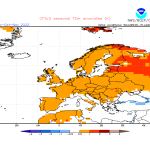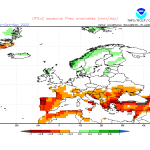
According to climate data, the mean temperature in August is of 27.1°C (a 31.4°C high and a 22.7°C low). August is climatically the hottest month of the year in the Maltese Islands. Precipitation in August averages 8.6 mm in a typical year. We’re expecting August 2022 to maintain the warmer than average trend set in the early days of summer. Temperatures should be consistently above average. Nights will continue to be particularly uncomfortable. The risk of an extreme heat wave is almost negligible, however. In similar fashion to July, August 2022 could feature an episode of instability around midmonth. This could bring an episode of isolated showers to central localities. No severe rainfall events are being anticipated, however. This would continue to prove our long-term outlook for this year’s summer correct. Back in May we said that: “Summer will be characterized by long waves of sweltering heat that will be broken up by occasional brief episodes of cooler than average temperatures and breezy conditions. These would bring some respite from recurrent waves of searing heat.”
- Long-term seasonal model for temperature for September/October/November 2022
- Long-term seasonal model for precipitation for September/October/November 2022
FURTHER OUTLOOK (TEMPERATURE) FOR SEPTEMBER-OCTOBER-NOVEMBER 2022 – Warmer than Average
FURTHER OUTLOOK (PRECIPITATION) FOR SEPTEMBER-OCTOBER-NOVEMBER 2022 – Drier than Average*
* A ‘Drier than Average’ outlook means that maps are pointing towards below normal storm system activity around the central Mediterranean. September is a hit-and-miss month. October normally marks a decisive start to the wet season. How autumn fares in terms of precipitation depends on whether rain-producing systems that form around the Maltese Islands affect land or not. Just one stormy episode may easily produce plentiful precipitation, pushing values to above average.
Disclaimer: Specific details on the weather may only be given for a couple of days in advance. This long-term forecast is not meant to determine specific weather parameters at a point on the Maltese Islands. Instead, it looks at large scale weather patterns across Europe, and attempts to determine how these may influence the weather locally. Our levels of confidence in the forecast for the month ahead are fair. These are reasonably lower when it comes to the ‘Further Outlook’ section. Weather forecasts are an interpretation of possible weather events based on trends, maps and climate data at the time of the forecast, and as a result, weather predictions may always change over time. Maltese Islands Weather can never be held responsible for any direct, indirect, incidental, consequential, special or exemplary damages or even lost profit resulting from any use or misuse of this data. The user assumes the entire risk related to the use or misuse of this data.



